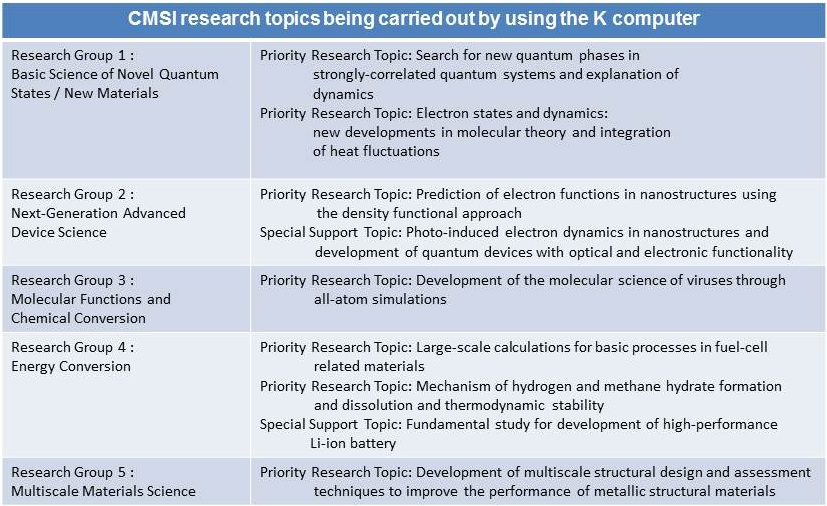Research Topics in CMSI
In the development of materials science, the role played by computer simulations is as important as that of theory and experiments. In the computational materials science, there are several simulation methods that have different degrees of accuracy and computational complexity, depending on whether the system is treated as a quantum system, classical system, or continuum system, etc. New paradigms are expected to result from further development and appropriate combination of these methods.
CMSI has established the following research groups in order to actively carry out this type of research. The research groups are pursuing close mutual interchange with one another.
Research Group 1 : Basic Science of Novel Quantum States / New Materials
New materials with novel properties have been discovered in recent years, including high-temperature superconductors (materials with zero electrical resistance) produced through iron and copper oxides, topological insulators (insulators in which only the surface exhibits metallic conduction), and fullerene and other nanocarbon materials.
This research group will determine the mechanism by which the functions of these new materials are manifested within the context of materials science, and will work to improve and establish more precise calculation methods (the Monte Carlo method, the MP2-F12 method and so on).
Research Group 2 : Next-Generation Advanced Device Science
The thin wire technologies for the semiconductors that control the performance of today's electronic devices are approaching the limit of their effectiveness. This research group will work to achieve a fuller understanding of the behavior of optical devices (components that use light in place of electrical signals), which have attracted considerable attention as a next-generation technology, as well as silicon nanowires (fine silicon wires measuring several nanometers in diameter) in an effort to achieve practical applications for these technologies.
Research Group 3 : Molecular Function and Chemical Conversion
This research group will treat biomolecules as materials in an effort to understand virus propagation/infection and immunological mechanisms on the molecular level. Based on the knowledge achieved through this research, simulations will be conducted for the docking of candidate drug materials and the proteins that make up viruses, in order to help in the discovery of new drugs.
Research Group 4 : Energy Conversion
An understanding of electrode chemical reactions is essential in order to discover materials that can provide increased capacity and longer life to the fuel cells and lithiumion batteries that are used in electric vehicles and the like. Moreover, in order to efficiently extract methane from methane hydrate (a compound consisting of methane enclosed by water molecules, which is expected to become an ecological energy source), the process by which methane hydrate forms and dissolves must be understood. This research group will work to elucidate these chemical reaction processes using computer simulations.
Research Group 5 : Multiscale Materials Science
To increase the toughness of iron and steel materials, an understanding of not only the microscale behavior of electrons and atoms but also their mesoscale internal structure growth is needed since the formation of structures in the coagulation process exerts an effect on the macroscopic properties of the products. This research group will conduct simulations whose goal is smooth linkage on various scales.

CMSI has established "Priority Research Topics" for computational materials science, in which research is needed urgently, as well as "Special Support Topics" that are considered to be candidates to become the next Priority Research Topics. For use of the K computer, computing resources allocated to CMSI are used for Priority Research Topics, while computing resources that have been secured by the researchers themselves (by applying for general use of the K computer) are used for Special Support Topics. Topics will be newly adopted or replaced through a review held in each fiscal year, judged by the parallelization efficiency achieved with respect to the K computer and the scientific importance of the topic in question.
In the following pages, seven CMSI Priority Research Topics and two of the Special Support Topics that have been selected for general use of the K computer will be profiled, based on interviews with representatives of each topic conducted by a CMSI Division Researcher. The Priority Area Researchers active in the study of each Priority Research Topic will also be featured.
(See Torrent No.3 for an explanation of CMSI's unique Division Researcher and Priority Area Researcher programs.)
(Tatsuya Sakashita,CMSI Condensed Matter Physics Division Researcher,Institute for Solid State Physics, The University of Tokyo)



